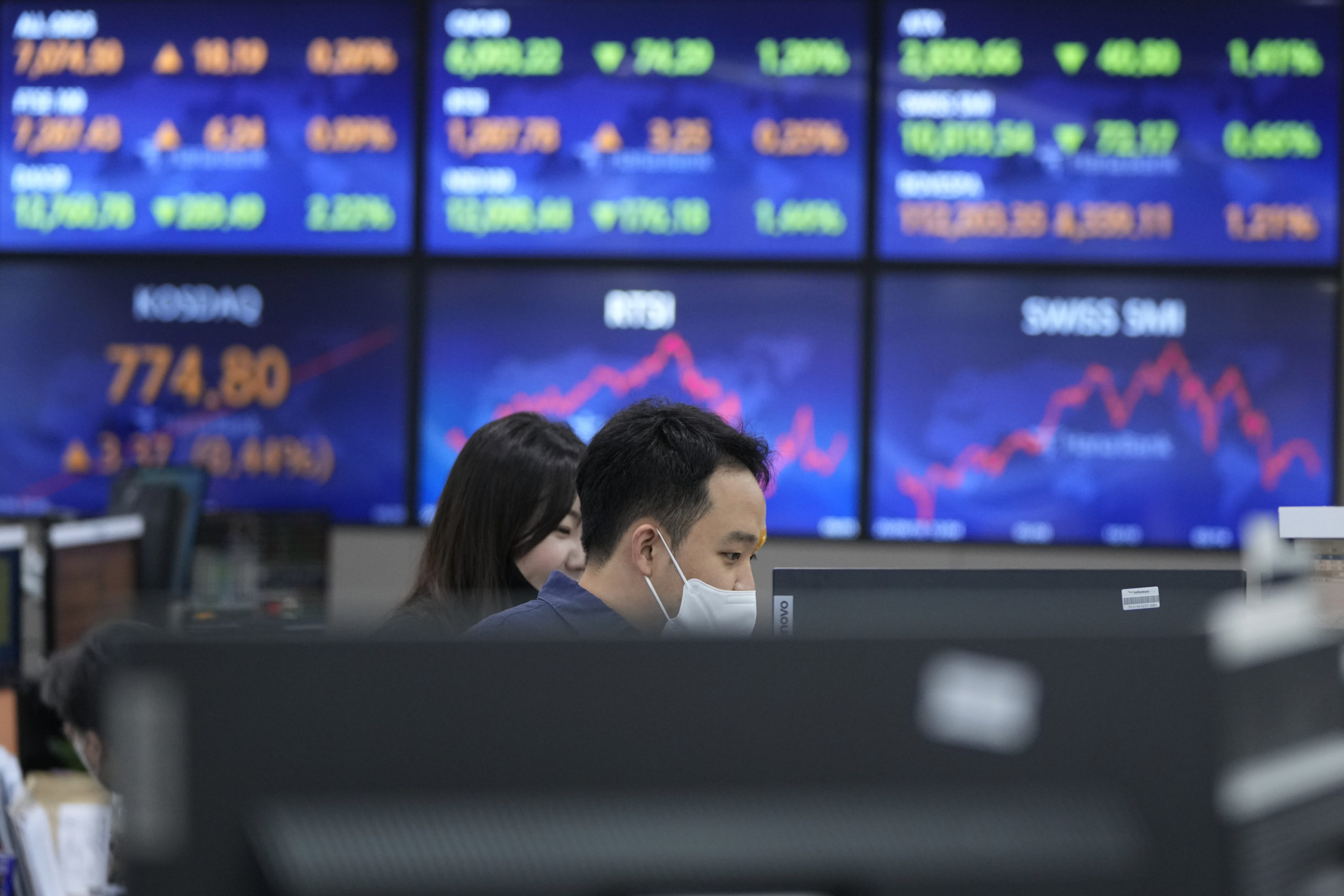 1
1 1
1
TOKYO (AP) — Asian shares were mostly lower Wednesday, as pessimism prevailed about higher interest rates ahead and Wall Street shares fell for the fourth straight week.
Shares fell in early trading in Tokyo, Sydney, South Korea and Hong Kong, but were little changed in Shanghai. Oil prices fell, while the Japanese yen continued to decline against the U.S. dollar to nearly 144 yen.
“The mood in markets is defensive ahead of key central bank decisions,” said Anderson Alves at ActivTrades.
Rising energy prices are adding to the worries about recessions in some parts of the world, he said.
In Japan, the government is giving 50,000 yen ($350) to needy families, to help cope with daily needs and energy prices in a move also designed to boost the lagging economy.
“The real solution to this inflation crisis obviously lies on the supply side, in terms of energy and other key goods. Yet that really takes us a step away from inflation-targeting and back towards an echo of how macro-stability was previously achieved,” according to RaboResearch.
Japan’s benchmark Nikkei 225 shed nearly 1.0% in morning trading to 27,362.83. Australia’s S&P/ASX 200 dropped 1.3% to 6,735.80. South Korea’s Kospi slid 1.5% to 2,373.14. Hong Kong’s Hang Seng dipped 1.7% to 18,884.75, while the Shanghai Composite was little changed at 3,243.55.
Shares fell on Wall Street coming into a holiday-shortened week. The S&P 500 fell 0.4% after bouncing between a gain of 0.5% and a loss of 1%. The Dow Jones Industrial Average fell 0.6% and the Nasdaq lost 0.7%.
The major indexes are coming off their third losing week in a row, part of a late-summer slump that erased much of the benchmark S&P 500’s gains from July and early August.
Stocks have been losing ground as the Federal Reserve has indicated it will not let up anytime soon on raising interest rates to bring down the highest inflation in decades.
In addition, Wall Street is grappling with worries about a brewing energy crisis in Europe and the implications it could have for the global economy and corporate profits, given that companies in the S&P 500 get half their revenue from abroad, said Michael Antonelli, market strategist at Baird.
“Each day that goes by that we have to talk about an energy crisis or a gas shortage or out of control electrical bills in Europe, the less the market can make constructive headway,” he said.
The S&P 500 fell 16.07 points to 3,908.19. The Dow slid 173.14 points to 31,145.30, while the Nasdaq fell 85.96 points to 11,544.91. Smaller company stocks fell more than the broader market. The Russell 2000 index fell 17.42 points, or 1%, to 1,792.32.
Technology and communications stocks were among the biggest losers.
Bed Bath & Beyond fell 18.4% following the death of its chief financial officer. The company has been suffering from a prolonged sales slump and executive turnover.
The company that wants to take Trump Media public, Digital World Acquisition, plunged 11.4% following reports it didn’t receive enough shareholder support for an extension to close the deal.
Markets have been slipping in recent weeks as inflation remains hot and the Federal Reserve stays on track to continue raising interest rates to try and tame stubbornly persistent high prices.
“There’s a fairly consensus view now that the Fed is going to be higher for longer and err on the side of inflation reduction over employment and growth,” said Mark Hackett, chief of investment research at Nationwide.
Bond yields rose. The yield on the 10-year Treasury, which influences interest rates on mortgages and other loans, rose to 3.34% from 3.19% late Thursday. The two-year Treasury yield, which tends to track expectations for Fed action, rose to 3.51% from 3.39%.
In energy trading, benchmark U.S. crude fell $1.52 to $85.36 a barrel. Brent crude, the international standard, fell $1.34 to $91.49 a barrel.
In currency trading, the U.S. dollar rose to 143.98 Japanese yen from 142.76 yen. The euro was little changed at 99 cents.
___
AP Business Writers Damian J. Troise and Alex Veiga contributed.
Yuri Kageyama is on Twitter https://twitter.com/yurikageyama